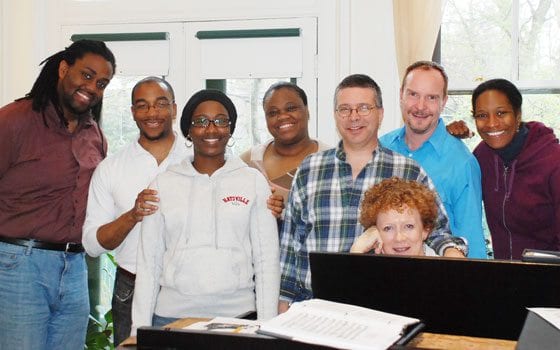
Ben Sears and Bradford Conner gravitate to centenaries. Witness their recent commemoration of the 100th anniversary of Irving Berlin’s “Alexander’s Ragtime Band.” Now the singing masterminds of Boston-based American Classics are giving the same kind of performance tribute to the work of another original, namely African American composer-performer Scott Joplin.
“We have been wanting to do excerpts from ‘Treemonisha’ for years,” Conner recently admitted. Now Conner and his collaborator are doing just that — and beginning a full program with a selection of Joplin’s piano rags — as they celebrate the centenary of the King of Ragtime’s lone opera Friday and Saturday.
“He’s one of our national treasures,” Conner observed. “There’s no one I know that doesn’t like Joplin. He’s a respected composer that’s written masterworks of the genre [ragtime].”
Sears concurred. “We love ragtime and we love Joplin’s work,” Sears said.
American Classics regulars Margaret Ulmer (piano), Jim Dalton (banjo) and Eli Newburger (tuba) will play a generous sample of Joplin’s beloved pieces — including such favorites as “Pine Apple Rag,” “Cascades,” “Solace” and “The Great Crush Collision March.”
Citing Joplin’s “Maple Leaf Rag” — which “swept the country” — as the first of the genre, Conner called it “a benchmark as far as ragtime and popular music are concerned.”
“This guy from Missouri [Joplin],” he continued, “kept writing in the genre and defined the style.” Summing up the composer’s achievement with ragtime, Conner remarked, “The name that is synonymous with the entire movement and genre is Joplin …That’s pretty impressive.”
The Library of Congress clearly agreed in 2002, with its inclusion of a collection of Joplin’s own performances (on piano rolls) in its National Recording Registry.
Also impressive for Conner and Sears is “Treemonisha,” the showpiece of the program. Never fully staged during Joplin’s lifetime (he died in 1917), the work finally received due attention in the 1970s with a performance of excerpts at Lincoln Center (1971), an Afro-American Music Workshop-sponsored two night staged orchestration at Morehouse College (1972) and a full opera production by Houston Grand Opera (1975). Sears suspected that Joplin’s opera “was rejected out of hand because he was black.” Conner praised the work’s then daring championing of education. “He [Joplin] understood that the way out of the wilderness for blacks was education, a pretty radical notion for the time.”
While Sears and Conner are not doing a full concert version of “Treemonisha,” they are trying to give audiences a good sense of the narrative of the three-act work. “The parts we’ve chosen follow the main plot of the story line.”
Set in a former slave community in an isolated forest near Texarkana, where the composer spent his childhood in 1884, the opera focuses on an 18–year-old woman who is taught to read by a white woman. Treemonisha (whose adopting mother Monisha found her under a tree) leads her community against the exploitation of superstition-brandishing conjurers. Eventually her community realizes the value of education and chooses her as their teacher-leader.
The American Classics collaborators have chosen some of the Hub’s finest musical performers to sing key roles in their performance. Anita Murrell will play Treemonisha and Christina DeVaughn Monisha. Merle Perkins, a local veteran singer-actress, will play a friend named Lucy.
Admitting that “The piece as a whole is difficult,” Conner welcomed the opportunity to showcase the opera. “There are exquisite moments,” he said.






